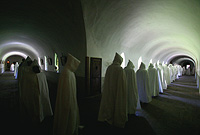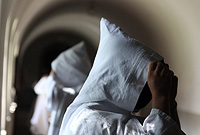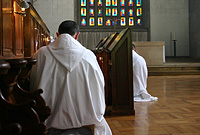Letter to our friends
January 29, 2010
Thin cows and fat cows: our economic future will be the one
that we build wisely.
Dear friends,
We have just celebrated the twenty-fifth anniversary of the death of Father Jérôme, who died on January 29, 1985. Few of you knew him, so you will find on our website a few extracts that describe him. A monk and priest at Sept-Fons, Father Jérôme (1907–1985) was able to transmit to our generation, in a refined and relevant way, what he had received. We owe it to him to be monks. The first extract, chosen from My Policy for the Present Time, offers no miracle solutions to current problems. It opens a door, changes our focus, takes our eyes away from the places we spontaneously look to. The second extract is a tribute to a monk, Brother Jacques, for whom Father Jérôme had tremendous admiration. Click here.
The winter has been tough everywhere. At Nový Dvůr, the well in the cloister disappeared under the thick layer of snow and the crèche, protected by the baroque porch, was regularly covered in a fine white sprinkling, which gave it a realistic appearance. There were just a few centimeters – a few millimeters! – of snow at Sept-Fons, a now-rare event. This did not bother me, as in France too, the winter was tough. Nature slowed down. These moments are ideal for meditation. Besides the production of the woodchips that warm us, the work is less demanding, our guests rarer, as the roads are difficult. In my Christmas letter, I wrote that we would soon have decisions to make. They are of an economic nature. The recent recession did not have the dramatic effects we could have feared, even though many of you and your families have had to cut down your spending. An economics professor came to the monastery in late January. He told us this: “As in the human body, the economy is sometimes healthy, sometimes sick; this is normal.” What was not normal was our lack of foresight. When Joseph announced to Pharaoh seven years of fat cows followed by seven years of thin cows, he proposed to save up reserves for the first seven years. We had twenty years of fat cows – and instead of saving up, we got ourselves into debt. What are we going to do in the coming years of thin cows?
The simple life that monks are used to living protects us from the never-satisfied attraction of a multitude of objects that lose their appeal as soon as we possess them. It is necessary to look elsewhere. That is where monastic life takes us. However, economic considerations have their place in our communities. How to organize our work so that it allows us to live, to maintain our buildings (at least partially), without its rhythm suffocating the life we lead? The choice of our products is important. As our products are made with great care and on a cottage-industry scale, they are naturally more expensive than mass-produced items. Yet we seek to avoid superfluous luxury products. The aim is to try to escape – at least partially – from the spiral into which the western world has fallen. Despite this caution, we still need to build and maintain.
In the spring of 2011, we plan to start work on a building that will house the mustard workshop, the laboratory, a cellar for garden vegetables and fruit from the orchard, a small workshop to work in during the wintertime, offices for the brother in charge of finances, his assistant, and accountants. This building will also be mostly funded by the fruits of our labor and by a modest loan. But the funds required will totally absorb our resources. We therefore ask you, this year and for the two-year building period, to contribute to the operation of the community. Without you, it will be impossible. We would like to know if we can count on you. Please write to us! If you need more information, please ask. This investment has no other aim but to offer the young people who enter our two communities an appropriate setting to lead a monastic life.
Luckily, one of the main virtues that monastic life teaches us is patience… The desks in the scriptorium are all occupied. We have just ordered five more. The classroom also needs more tables! That is a good thing. None of these investments are considerable, but it all adds up... Around the monastery, last year we were able to build a new garage. Belgian friends donated a twenty-five-year-old Fendt tractor, which works very well, and everything we need for haymaking. This equipment is now under cover and our ewes are fed, this winter, with refined hay. We have also been given an old car, which will be very helpful. Between the boiler room and the garden, there is a sort of wasteland that is muddy when it rains and treacherously slippery when it snows, and generally just not very elegant. Our intention is to build a supporting wall because the land is on a slope, plant a row of trees along it, and build a few wooden cabins against it to store garden tools, outdoor maintenance equipment, and the beehives. We believe it will be the most elegant solution without being extremely costly. It is our major project for the year. You are aware of the costs of construction: whatever we do, we cannot do it for less than $80,000. Finally, to save money, brother André has strongly urged the brother in charge of finances to invest in a second-hand mechanical digger (unless one of you has a spare one in your garage!). This costs around $14,000. The investment will be paid off when we dig the foundations for the workshop building.
A quarter of the community of Nový Dvůr and the last four brothers who entered the novitiate have taken their vows. This is encouraging: God can call to His service people who have not followed ordinary paths. What are these young people like? Enthusiastic and unstable, sensitive and anxious, generous and often clumsy, completely undisciplined and yet striving toward lasting effort. One of them told me the other day: “I expect kindness from you, but especially firmness.” And another one said: “Until I was ten years old, I received the good education of a Christian family, but afterwards, in the classroom, nothing and no one laid down the rules.” These people are not responsible for structural defects, but we cannot abandon the responsibility imposed by this situation. The monastery, said Saint Benedict, is the school of service to the Lord. It is therefore necessary to force these youth to return to their schoolbooks. And God knows how thirsty they are to learn!
Soon after Easter, the priests from the diocese of Plzeň, with our bishop, will come to celebrate the year of Saint Jean-Marie Vianney. I will talk to you about this in my next letter. In the meantime, I wish you a good Lent. It will be well underway by the time you receive this letter, and may even be close to the end. We count on you and your prayers. You can count on ours.
Yours faithfully
F. M.-Samuel, prior
My policy for the present time
February 2009
September, 2nd 2014
Autumn 2013
July 5, 2013
March 10, 2013
A few weeks before Christmas 2012
September 2, 2012, Solemnity of the Dedication of Novy Dvur
Whit Sunday 2012
January 11, 2012
September 30, 2011, Feast of Saint Jerome
May 1 2011
September 2 2010
May, 2010
Pentecost 2009
February 2009
May, 2008
February 2, 2008
September 2, 2007
July 5, 2007
September 2, 2006
March 25, 2006
February 2, 2006
September 2, 2005



